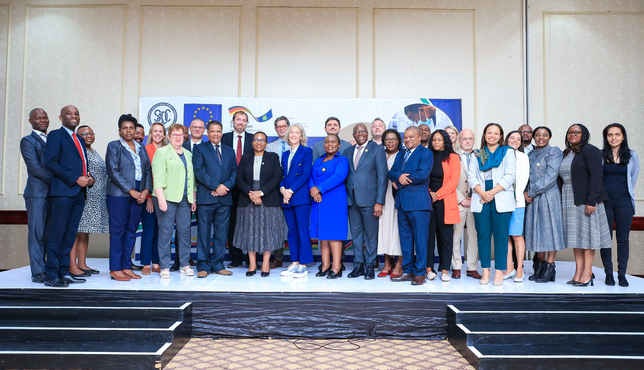Grand Finale Celebrates Success of SIPS Programme in Boosting SADC Industrialisation

The grand finale of the Support towards Industrialisation and the Productive Sectors (SIPS) programme was held on 21 May at the Avani Hotel in Gaborone, Botswana. The event not only marked a significant milestone in the discourse on regional economic integration, but also celebrated the achievements of a landmark initiative within the Southern African Development Community (SADC) region.
The SIPS programme, a flagship initiative of GIZ's Cooperation for the Enhancement of Southern African Development Community (SADC) Regional Economic Integration (CESARE) programme, received funding totalling more than 20 million Euros from the German Federal Ministry for Economic Cooperation and Development (BMZ) and the European Union (EU). It was a joint effort between SADC, the German government and the EU, with a focus on promoting self-sustaining economies, reducing import dependence and strengthening regional resilience, particularly in the agro-processing and pharmaceutical sectors across the SADC region.
At its core, the SIPS programme targeted critical value chains, including the leather, medical and pharmaceutical sectors. By addressing policy, regulatory and business environment constraints, it aimed to strengthen private sector engagement, thereby promoting job creation and expanding the industrial base in line with the objectives outlined in the SADC Regional Industrialisation Strategy 2015-2063 and the Regional Indicative Strategic Development Plan 2020-2030.
One of the most remarkable aspects of the SIPS programme has been its adaptability. In response to the emergence of the Covid-19 pandemic, the programme quickly pivoted to include the Covid-19 Medical and Pharmaceutical Products (CMPP) value chain. This expansion facilitated innovative manufacturing projects for Covid-19-related medical and pharmaceutical consumables and devices, providing a tangible response to the urgent needs of the time.
Ambassador Margit Hellwig-Bötte, German Ambassador to the Republic of Botswana, praised the programme's response to the pandemic, citing its support for the production of masks, protective clothing and medical equipment as evidence of its effectiveness.
The impact of the SIPS programme was further underlined by Ambassador Petra Pereyra, Head of the European Union Delegation to Botswana and SADC. Drawing parallels with the European Union's integration experience, she hailed the programme as a prime example of the 'Team Europe' approach, highlighting its role in aligning regional and national objectives, fostering a sustainable momentum for integration and advancing policy formulation.
In terms of concrete achievements, the programme facilitated the creation of 164 permanent jobs, involved over 330 people in networking activities and provided training to 690 staff from beneficiary companies. It has also provided information on funding opportunities to over 180 enterprises and helped 17 enterprises to achieve international standards for environmentally sustainable production.
Looking to the future, Mr Dhunraj Kassee, Director-Directorate of Industrial Development & Trade at SADC, expressed confidence in the lasting impact of the programme. He highlighted its role in strengthening regional value chains and promoting sustainable industrialisation, setting the stage for increased trade and cooperation within the SADC region.
The grand finale not only showcased the extensive activities and achievements of the SIPS programme, but also served as a platform for stakeholders to reflect on past efforts, share experiences and chart the course for future endeavours in regional value chain development and integration. Ultimately, the success stories emerging from the SIPS programme are a testament to its transformative potential in driving economic growth and prosperity across the SADC region.
Author: Meron Estifanos